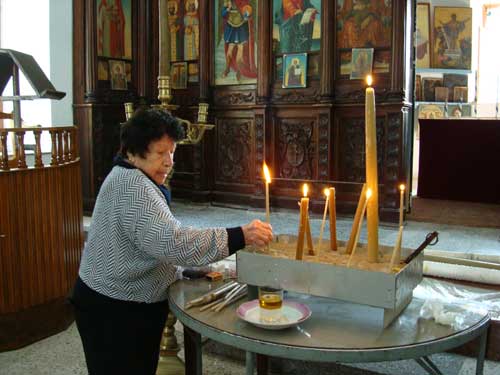The last Greek Cypriot living in Kyrenia
IN 1960 Kyrenia was a small market town with just 3,000 inhabitants, of which only 100 were Turkish. Today everything has changed. From above, Kyrenia looks like a large city: all its northern shores have been built-up and the town has joined up with large villages along its northern shores, inhabitation now runs dozens of kilometres east and west of the city. Today more than 60,000 Turks live in Kyrenia. Amid this Turkish crowd lives Kyrenia’s last Greek Cypriot.
Angeliki Yiasar is 80 years old. She has spent her entire life in Kyrenia with her Turkish Cypriot husband Sami Yiasar. Her paternal home is a traditional Cypriot house with an upper floor and internal courtyard, flowers planted in tin pots and a well that’s run dry, in line with the town’s Greek character. Angeliki has fought tooth and nail to safeguard this personal sanctuary, living in conditions of isolation for decades.
Today, under clearly better circumstances, she is enjoying the last stages of her life with her husband and has only one hope: to live to see the reunification of
The couple’s personal adventure started on the dramatic morning of July 20, 1974 when Kyrenia awoke to explosions from bombshells being fired from Turkish ships’ cannons that blasted the Pendadaktylos mountainside. Terrified, Greek Cypriots abandoned the town in great haste. Angeliki remained behind with Sami.

Although her husband was a Turkish Cypriot, the couple lived in a Greek neighbourhood and at home only spoke, and continue to speak, Greek. Her two children learned to read and write at a Greek school and according to fate they became the last Greek speaking permanent residents of Kyrenia.
The couple’s story goes back to a time of Cypriot innocence. To the beginning of the 50s, before nationalism clouded peoples’ minds. Sami was the family chauffer. He fell in love with Angeliki and asked her father for her hand in marriage. Her father agreed. Angeliki did not want him because he was of another religion. She later compromised and made what today she evaluates as the best decision of her life.
She and Sami were married in a civil ceremony at the offices of the Kyrenia colonial administration. They had two sons, Andreas and Anthimos. Not long after, the struggle for Union (with
Fifty-six years after their marriage the couple are still in love. “I’ve been very lucky in my life to have married this person,” Angeliki says today, who took us into her home. “
Today their life is much easier. With the opening of the checkpoints and free movement they come and go to
But this was not always so. The first years after the invasion, their life was tragic. Kyrenia was flooded with Turkish troops. One of their sons, due to the unsettling situation in
At the time Sami worked at the American radio station in Karava, west of Kyrenia. With the Americans’ help the couple managed to get their son out of occupied
Near Angeliki’s home, in Pano Kyrenia, is the neighbourhood church dedicated to St George. It was built in 1952, the year she married Sami. It is where she baptised her two children and after Kyrenia was abandoned by its inhabitants she undertook the responsibility to preserve it.
Nearly all the churches in the occupied areas were either destroyed or turned into mosques.
“I was asked for the keys many times so that they could turn it into a museum but I refused to give them to them. I will give them to the priest and the church committee that will take it over following a solution to the
Angeliki Yiasar cleans the church and at her initiative, a Kyrenian, Takis Neophytou, has taken on its renovation. The
Today a lot of Kyrenians who visit their town go by and pay homage at the
Makarios Drousiotis
Cyprus Mail
18/05/2008